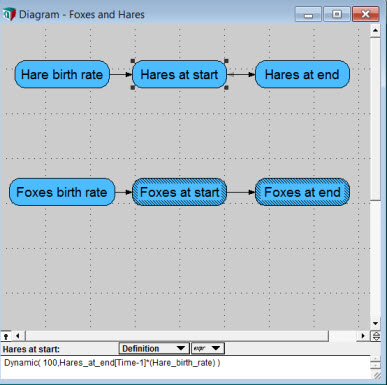Difference between revisions of "Defining hare population as a function of time"
| Line 35: | Line 35: | ||
[[Image:Attritbute Hares at end 1.1.jpg]] | [[Image:Attritbute Hares at end 1.1.jpg]] | ||
| − | * Click on the | + | * Click on the ‘Show result’ button on the tool palette. |
'''Expected: A result graph window should appear.''' | '''Expected: A result graph window should appear.''' | ||
| − | |||
| − | |||
[[Image:Result window.jpg]] | [[Image:Result window.jpg]] | ||
Revision as of 06:34, 19 December 2009
- Select Hares at start. Click on the key icon to open the Attribute panel. Click on the Description field, type ‘The hare population at the start of each time period.’ Press alt+enter.
- Select Definition from the Attribute popup menu. Click on the expr popup menu, select ‘other’. Object finder window should appear.
- Select ‘Special’ from the Library popup menu.
- Select Dynamic to open parameter box for Dynamic function(). Click on the Dynamic field. Type ‘100, Hares_at_end[Time-1]*(1+Hare_birth_rate)’. Click ‘ok’ button.
- Press alt+enter to accept the definition.
Expected: You should have this result.
- Select ‘Hares at end’. Select ‘Description’ from the Attribute popup menu. Type ‘The hare population at the end of each time period.’
- Select ‘Definition’ from the Attribute popup menu. Click on the definition field.
Expected: Inputs popup menu should appear.
- Select ‘Hares at start’.
- Click on the ‘Show result’ button on the tool palette.
Expected: A result graph window should appear.
Comments








Enable comment auto-refresher